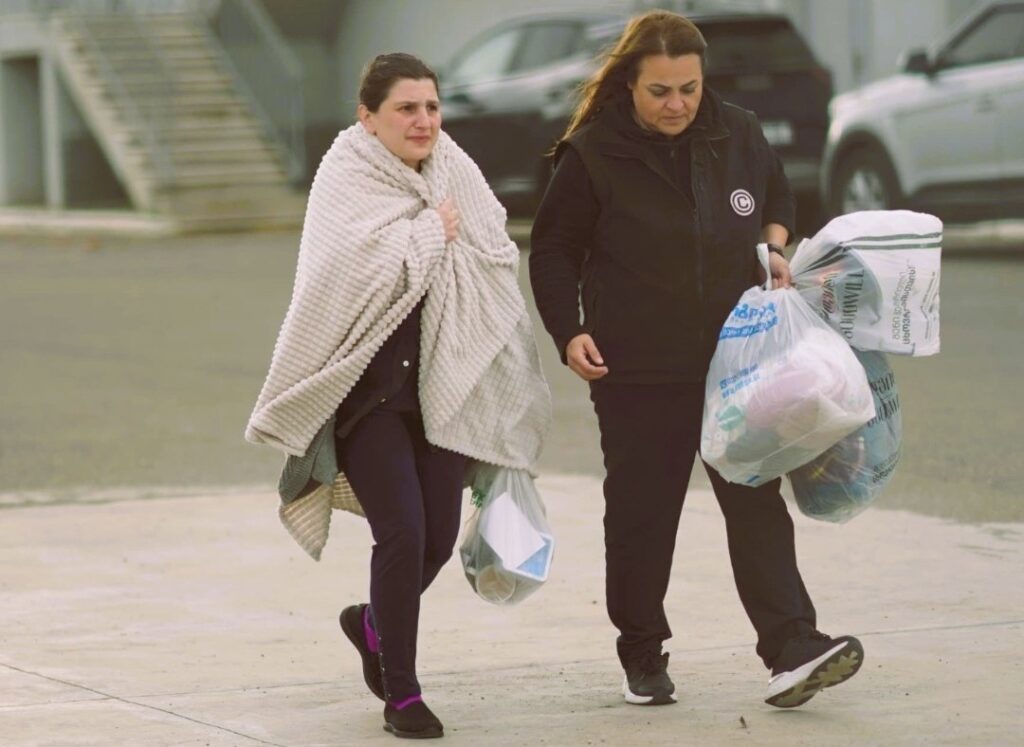'Don’t hug me, it hurts' - Georgian teacher-activist freed only after losing ability to walk
Release of activist Nino Datashvili in Georgia
After four months in pre-trial detention, teacher Nino Datashvili, who was arrested during the pro-European protests in Georgia, was released on bail on October 29.
The young teacher was freed only after it became clear that she was suffering from severe spinal pain and was losing the ability to walk.
- Georgian poet behind bars: protest and arrest of Zviad Ratiani
- Georgian journalist Mzia Amaghlobeli sentenced to two years in prison
- Failed ‘peaceful revolution’ and new repressions: where Georgia is heading after October 4
Hunched and pale, Nino Datashvili slowly left the yard of the Rustavi women’s prison. She was limping. In one hand, she carried her personal belongings in a clear plastic bag, while the other tried to hold onto a blanket draped over her shoulders, which the strong wind kept tugging at.

“Please, don’t hug me, everything hurts,” she told her family, friends, and supporters who had gathered outside the prison to greet her.
She was unable to give any comments to journalists.
“I just want to sit,” she said, thanking everyone.
“Please don’t photograph me,” she asked the reporters. But the journalists and camera operators, stunned and confused by what they were seeing, had already captured the first shots of her leaving the prison.
How did the teacher end up in detention?
Nino Datashvili is a social studies teacher and an active participant in the pro-European protests in Georgia, which have been ongoing for more than a year.
She was arrested on June 20 of this year. According to the prosecution, on June 9 she attacked a bailiff at the Tbilisi City Court, where arrested activists were being tried, and she had gone there to support them.
She has been charged under Article 353, Part 3 of the Criminal Code, which carries a sentence of 4 to 7 years in prison.
On the day it all happened, Nino Datashvili was unable to get into the courtroom, which was overcrowded, and she stood by the entrance. At that time, photo and video recording in the court building had not yet been banned, and eyewitnesses captured the events on video.
The footage shows a court bailiff demanding that Datashvili leave the building. She asks why she is being expelled and sits on the windowsill in protest. A verbal altercation ensues between her and the bailiff, after which she is forcibly removed from the building.
Datashvili tries to break free, but she is roughly dragged outside. She resists. At that moment, the head of the bailiff service, David Matiashvili – known for his aggressive behavior toward protesters – appears in the footage.
Once outside, Nino Datashvili, who had been subjected to violence by a law enforcement officer, called the emergency service 112 and filed a complaint. The police took no action. About ten days later, she was suddenly arrested on the street.
She was taken from a bus stop without being told the reason for her arrest.
Later, Nino spoke about the brutal treatment she endured.
“They acted as if I were a terrorist. How is it possible to treat a person this way, even if they are accused? They used violence, took my phone, did not explain my rights, and didn’t allow me to call my son or my lawyer,” Nino told the court.
“They stripped me naked at the station! I demanded that a lawyer come first, and only after speaking with them would I sign anything.”
On June 21, Nino Datashvili was placed in pre-trial detention, despite the court already being aware of her serious health condition.
While she was in prison, rumors spread that she was being forcibly transferred to a psychiatric hospital because she was crying frequently. This news caused a public uproar.
Her lawyers later clarified publicly that Nino was crying due to pain. Under public pressure, the prosecution was unable to carry out the transfer.
Health problems of Nino Datashvili
Nino has spinal issues, including herniated discs in both the lumbar and cervical regions. This condition troubled her even before her arrest. In 2019, she underwent surgery on her lumbar-sacral spine.
Soon after her arrest, her lawyers reported that Nino’s condition was deteriorating in prison.
On October 28, it became known that the teacher’s health had sharply worsened.
“Nino was brought to the hearing in a wheelchair. She sat pale and stiff, with an immobile neck. It was a struggle to get her up the steps and into the room. They barely managed to seat her in a chair to avoid worsening her pain,” wrote her husband, Godi Pruidze, on social media.
He explained that Nino’s right leg, arm, and neck had not moved for over a month. She requires another surgery on her lower back. She also has a herniated disc in the cervical spine on both sides, making the surgery even more urgent.
Her friend, Nino Kalandia, wrote on social media: “She told me she had written her will. Just imagine what this person is going through.”
On October 8, the organization Partnership for Human Rights, which represents Nino Datashvili in court, reported that its staff were shocked by her condition. “This is inhumane and resembles torture,” the organization said.
- “Take off the mask!” how Georgian government tackles face mask use
- Amnesty International: ‘Georgian authorities intend to silence protesters through intimidation and punishment’
- In six months, Georgia passed five laws restricting media. Here’s a breakdown
“I will only survive if you get me out of here”
The court hearing in Nino Datashvili’s case was scheduled for October 29 at 12:00. On that day, the court was supposed to begin the substantive trial. Previously, the hearing had already been postponed twice due to her serious health condition.
Nino herself was to join the process online from prison.
Her supporters began lining up outside courtroom 3 of the Tbilisi City Court half an hour before the hearing. In the end, far more people showed up than the 40-person room could hold. Those who could not enter remained in the corridors.
The trial began late. The judge and everyone present waited for an hour in the hot courtroom for the prosecutor in the case, Medeya Tsiramua. Nino’s elderly mother was also present in the room.
The judge’s assistant repeatedly called the prosecution to find out what was happening. She also tried to reach the prison administration to understand why Nino was not appearing online.
Judge Tamar Mchedlishvili gradually began losing patience.
Around 12:50, a statement from the prosecution appeared on social media.
It turned out the prosecution had filed a motion to change the measure of detention.
Emotional murmurs filled the room. The judge demanded silence.
Meanwhile, they finally managed to reach the prison administration. Nino Datashvili did not appear on the screen in the courtroom; only her voice was heard. “My back is breaking,” Nino said with sighs and tears, asking someone to bring her another chair so she could rest her legs on an elevation.
“Hold on a little longer, Nino, the prosecution has requested to release you on bail,” said her lawyer Tamar Gabodze.
A hopeful silence fell over the courtroom. Some of those present cried. Nino’s mother also wept, sitting in the front row, hoping to see her daughter on the screen.
Prosecutor Tsiramua entered the courtroom at 13:00.
The prosecution ultimately requested Nino Datashvili’s release on bail set at 5,000 lari (approximately $2,800). The judge granted the motion.
“I will not express gratitude to the prosecution. Nino’s suffering and her current condition—when she can no longer move, care for herself, or walk—are on the conscience of the prosecution. They knew about her health condition at the first hearing and took no action until this moment,” said lawyer Tamar Gabodze.
“To survive, release me from here today,” Nino Datashvili’s voice echoed through the courtroom.
She said the prison doctors were doing everything possible to help her, and she was grateful, but her condition continued to deteriorate.
Judge Mchedlishvili proposed that the court postpone consideration of any other motions to immediately begin executing the decision to release Nino Datashvili on bail. Both sides agreed.
Nino Datashvili was given one month to pay the bail. Immediately, even before anyone had left the courtroom, a fundraising campaign for her began on social media.
The required 5,000 lari was raised in 8 minutes.
“I didn’t even have time to log into my online bank on my phone,” supporters said in the courthouse corridors.
Most of the people in the courtroom immediately traveled to Rustavi to meet Nino as she was released from the colony.
The next hearing in Nino Datashvili’s case is scheduled for November 13 at 12:00.
News in Georgia



















